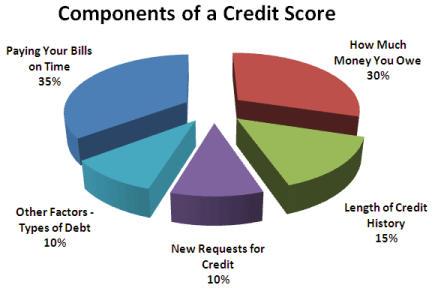Credit Scoring: Breaking It All Down

Credit scoring is a skill worth having.
On the credit scoring spectrum from 300-850, you may think you need an 800 or higher to get the best terms and interest rates on your next loan. You don’t! You could qualify for the best mortgage rates with a score of 760+. A 720+ scoring could help you get the best rates on an auto loan. This is based on credit score alone. There are other factors that will determine whether you get approved for a loan or not. Following a few simple tips could help you earn a great number. Establish a long history of good credit by sticking to these habits. Whether you’re shooting for a 760 or an 850, getting an excellent number can be a lot of work, but the payoffs are rewarding.
If you suspect that your credit report has errors, removing those negative items may be the fast way to improve your credit. Based on CreditCards.com and CNNMoney, a single negative in your credit may cost you over 100 credit points.
| 35% PAYMENT HISTORY How often do you pay your accounts on time? Late payments may lead to a lower score. | 15% HISTORY OF ACCOUNTS How long have you had you credit line? A long history of responsible credit use will likely result in a higher score | 10% TYPES OF CREDIT USED Do you have more than one type of credit line? Having different types of credit lines that are reported to the bureaus will help you score. |
| 30% AMOUNT OWED How much of your available credit have you used? Less is More! Lowering your balance can have a positive effect on your credit score. | 30% NEW CREDIT LINES Have you opened a new credit line lately? Opening too many credit lines at once is a bad idea, while opening a new credit line once in awhile is healthy. |
